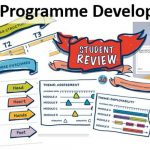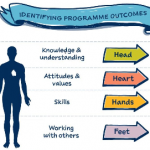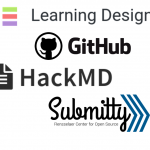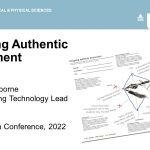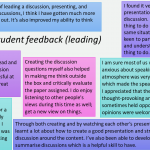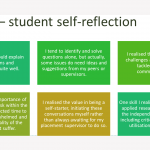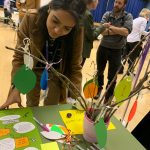Roundtable Discussion Notes A free-ranging conversation that viewed ‘authentic’ as a continuum rather than a specific endpoint. Three overlapping themes emerged: Aligning with what employers expect. Less then 10% of students stay in the HE system (including PG programmes). OverContinue reading… Authentic assessment – a holy grail or just a fad?
Category: Conference/Post Themes
UCL Education Conference 2022 themes.
An institutional approach to align assessment and learning design
Clive Young and Simon Walker, UCL Education and Student Experience UCL aims to provide end-to-end support for programme teams, from conception through to delivery and review, with a particular focus on assessment. UCL has created a new Programme Development TeamContinue reading… An institutional approach to align assessment and learning design
Better learning outcomes, better assessment
Clive Young and Simon Walker, UCL Education and Student Experience Learning outcomes should accurately define what students should learn during a programme of study and serve as a formal reference point for students and the institution. Well-written learning outcomes mayContinue reading… Better learning outcomes, better assessment
Authentic master’s dissertations through student-community partnerships
Presenter: Anne Laybourne, Students’ Union UCL Format: Case Study/Individual presentation The dissertation is one of eight sections comprising the Postgraduate Taught Experience Survey. Overall satisfaction scores are high – 81% in 2020 – but sub-scores are lower; support with dissertation planningContinue reading… Authentic master’s dissertations through student-community partnerships
Assessment Without Grades: Co-Authoring With Students
Would our students do any work at all if it wasn’t for a grade? Would they even bother to show up? I think the assumption that we need the extrinsic motivation of grades and marks and credits and degree awardsContinue reading… Assessment Without Grades: Co-Authoring With Students
From 50 to 150: growing in numbers while improving in quality
Presenters: David Pérez-Suárez and Anastasis Georgoulas, Centre for Advanced Research Computing Format: Case study/individual presentation MPHY0021 is a postgraduate module on software engineering practices for research. Over the last few years, the cohort has approximately trebled in size which, alongContinue reading… From 50 to 150: growing in numbers while improving in quality
Reflecting on Assessment and Diversity at UCL Queen Square Institute of Neurology
Dr. Caroline Selai, Ms. Mina Uddin & Ms. Elisabeth Long During this well-attended and dynamic session, we reflected on giving and receiving feedback which is done within a relationship. Why do receivers of feedback sometimes perceive it as (i) criticalContinue reading… Reflecting on Assessment and Diversity at UCL Queen Square Institute of Neurology
Designing Authentic Assessment
Presenter: Richard Osborne (MAPS) & Marieke Guy (Digital Education) Format: Workshop This workshop presented the results of a Jisc funded project that finished in 2014, which produced a range of tools and techniques to support the design of authentic assessments.Continue reading… Designing Authentic Assessment
Roundtable Discussion: Using the student voice to transform medical student portfolios
Roundtable discussion presented by Charlotte Hammerton, Carys Phillips; Taylor Bennie, Lizzie Vacher and Alison Sturrock from UCL Medical School Abstract The UCLMS clinical portfolio, which encompasses a range of mandatory activities involving assessment, feedback and reflection, was unpopular among students.Continue reading… Roundtable Discussion: Using the student voice to transform medical student portfolios
Using the student voice to transform medical student portfolios
Abstract Presenter: Charlotte Hammerton and Carys Phillips, UCL Medical School The UCLMS clinical portfolio, which encompasses a range of mandatory activities involving assessment, feedback and reflection, was unpopular among students. Further investigation through focus groups revealed students perceived the portfolio asContinue reading… Using the student voice to transform medical student portfolios
Feedback Practices in a Masters Programme – How can we Help Our Students to Better Understand Their Feedback?
Round table discussion presented by Dr Sumanjit Gill with co presenters Karen Matthewman and Dr Caroline Selai Facilitated by Dr Martin Compton This was a well attended discussion with contributions from attendees from around the UK in addition to departmentsContinue reading… Feedback Practices in a Masters Programme – How can we Help Our Students to Better Understand Their Feedback?
Providing a range of engagement options to support student abilities: a single module case study
Author: Jennifer A. L. McGowan jennifer.a.l.mcgowan@ucl.ac.uk Abstract A conversation that frequently appears in both pedagogy and the media is whether traditional assessment is inclusive to all learning types and appropriately reflects the range of skills that a student may have.Continue reading… Providing a range of engagement options to support student abilities: a single module case study
Providing opportunities for student soft skills development – a case study
Author: Jennifer A. L. McGowan jennifer.a.l.mcgowan@ucl.ac.uk Abstract As well as academic success, we pride ourselves at UCL on providing opportunities for students to learn soft skills (management, communication, leadership etc.) that will be of benefit to them in attaining and succeeding inContinue reading… Providing opportunities for student soft skills development – a case study
Designing alternative assessments
The UCL Digital Assessment Team were on hand at the Education conference to help with assessment queries. They facilitated a marketplace stand encouraging attendees to ‘Design alternative assessments’. UCL staff were encouraged to read the alternative assessments poster and beContinue reading… Designing alternative assessments
Can ‘ungrading’ change the way students engage with feedback and learning?
Dr Eva Mol; Dr Martin Compton – summary of our paper presented at the UCL Education conference 6th April 2022 Introduction ‘Ungrading’ is a broad term for approaches that seek to minimise the centrality of grades in feedback and assessment.Continue reading… Can ‘ungrading’ change the way students engage with feedback and learning?

